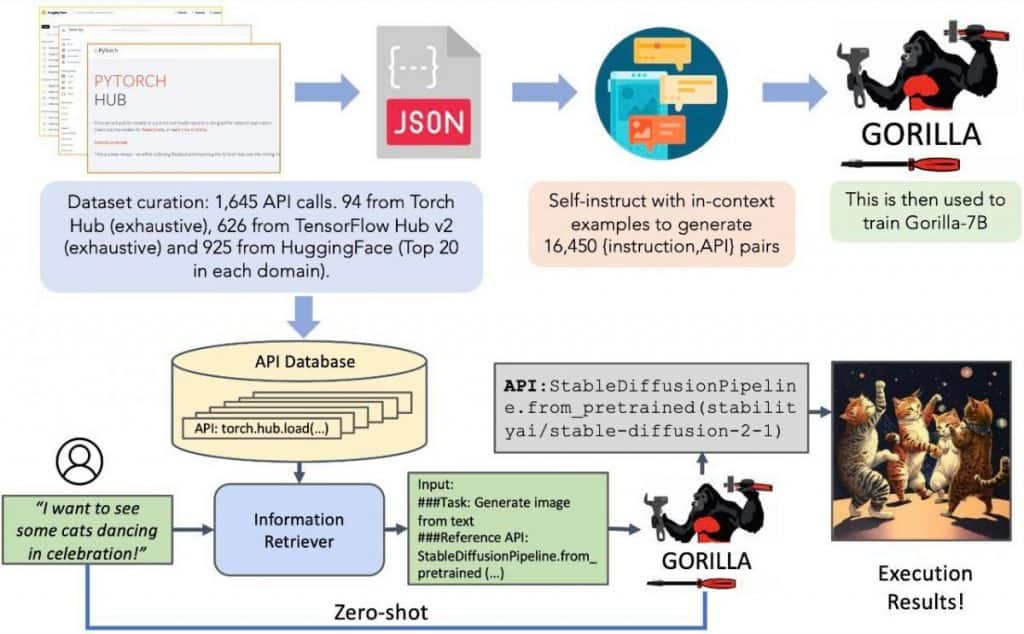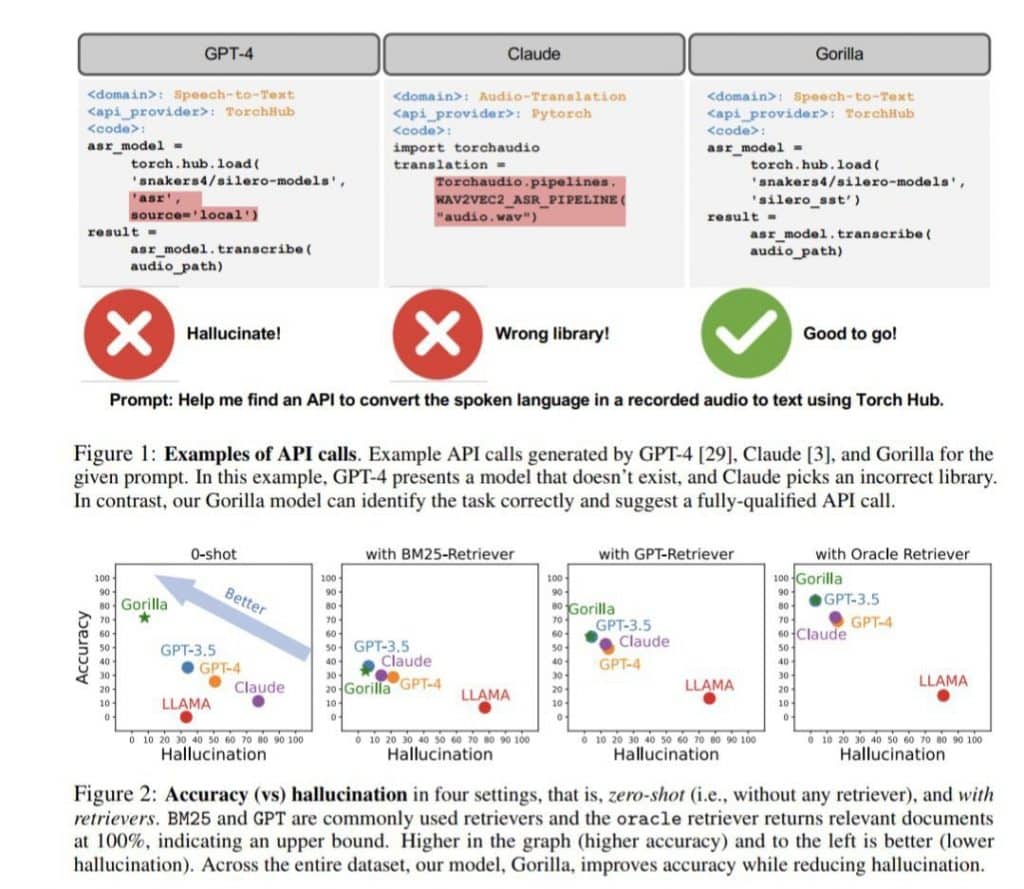LLMs have advanced significantly, but their inability to access real-time data and use third-party tools efficiently has prevented them from realizing their full potential. A remedy has been found to deal with this problem: The way that models communicate with outside resources is through Gorilla, a sizable language model coupled with a wide range of APIs.

A team of researchers successfully integrated over 1600 APIs into the LLaMa-7B model, surpassing the performance of even GPT-4 and Claude AI in terms of the quality of API calls. Open-source projects have been at the forefront of this advancement, paving the way for greater accessibility and collaboration.
The primary focus lies in the seamless integration of neural networks with popular platforms such as Torch Hub, HuggingFace, and Tensorflow Hub. The objective is simple: given a natural language query, Gorilla determines the most appropriate API call to make. This capability opens up a realm of possibilities, allowing for the development of smart pipelines where different models are invoked based on user requests.
LLMs have demonstrated exceptional progress in various tasks, including mathematical reasoning and program synthesis. Their ability to effectively utilize tools through API calls has remained underutilized. Gorilla aims to bridge this gap, offering a finely-tuned LLaMA-based model that outperforms GPT-4 in generating accurate API calls.

The significant advantage of Gorilla is its integration with a document retriever, enabling the model to adapt to real-time document changes. This flexibility allows for seamless updates or version changes, ensuring reliable and up-to-date outputs. Gorilla reduces the issue of hallucination, a common challenge faced when directly prompting LLMs.
To evaluate Gorilla’s capabilities, the researchers introduce APIBench, a comprehensive dataset comprising HuggingFace, TorchHub, and TensorHub APIs. The successful integration of the retrieval system with Gorilla showcases the potential for LLMs to utilize tools more accurately, keeping pace with frequently updated documentation and enhancing the reliability and applicability of their outputs.

Gorilla marks a significant milestone in the evolution of LLMs, empowering them to invoke APIs with precision. With the ability to accurately determine the appropriate API call based on natural language queries, Gorilla sets a new standard for reducing hallucination and improving overall performance. The researchers have also released APIBench, the largest curated collection of APIs, providing a valuable resource for training and development.
The team behind Gorilla invites collaboration, aiming to expand the largest API store and continue teaching LLMs how to effectively interact with APIs. Whether through joining their Discord community, opening a PR, or reaching out via email, developers and API creators are encouraged to participate in this endeavour.
Read more about AI:
Read More: mpost.io









 Bitcoin
Bitcoin  Ethereum
Ethereum  Tether
Tether  XRP
XRP  Solana
Solana  USDC
USDC  Dogecoin
Dogecoin  TRON
TRON  Cardano
Cardano  Lido Staked Ether
Lido Staked Ether  Wrapped Bitcoin
Wrapped Bitcoin  Hyperliquid
Hyperliquid  Wrapped stETH
Wrapped stETH  Sui
Sui  Chainlink
Chainlink  Avalanche
Avalanche  Stellar
Stellar  LEO Token
LEO Token  Bitcoin Cash
Bitcoin Cash  Toncoin
Toncoin  Shiba Inu
Shiba Inu  USDS
USDS  Hedera
Hedera  WETH
WETH  Wrapped eETH
Wrapped eETH  Litecoin
Litecoin  Polkadot
Polkadot  Binance Bridged USDT (BNB Smart Chain)
Binance Bridged USDT (BNB Smart Chain)  Monero
Monero  Ethena USDe
Ethena USDe  Bitget Token
Bitget Token  Pepe
Pepe  Pi Network
Pi Network  Coinbase Wrapped BTC
Coinbase Wrapped BTC  WhiteBIT Coin
WhiteBIT Coin  Aave
Aave  Uniswap
Uniswap  Dai
Dai  Ethena Staked USDe
Ethena Staked USDe  Bittensor
Bittensor  Aptos
Aptos  OKB
OKB  Cronos
Cronos  NEAR Protocol
NEAR Protocol  BlackRock USD Institutional Digital Liquidity Fund
BlackRock USD Institutional Digital Liquidity Fund  Internet Computer
Internet Computer  Jito Staked SOL
Jito Staked SOL  Ethereum Classic
Ethereum Classic  Ondo
Ondo